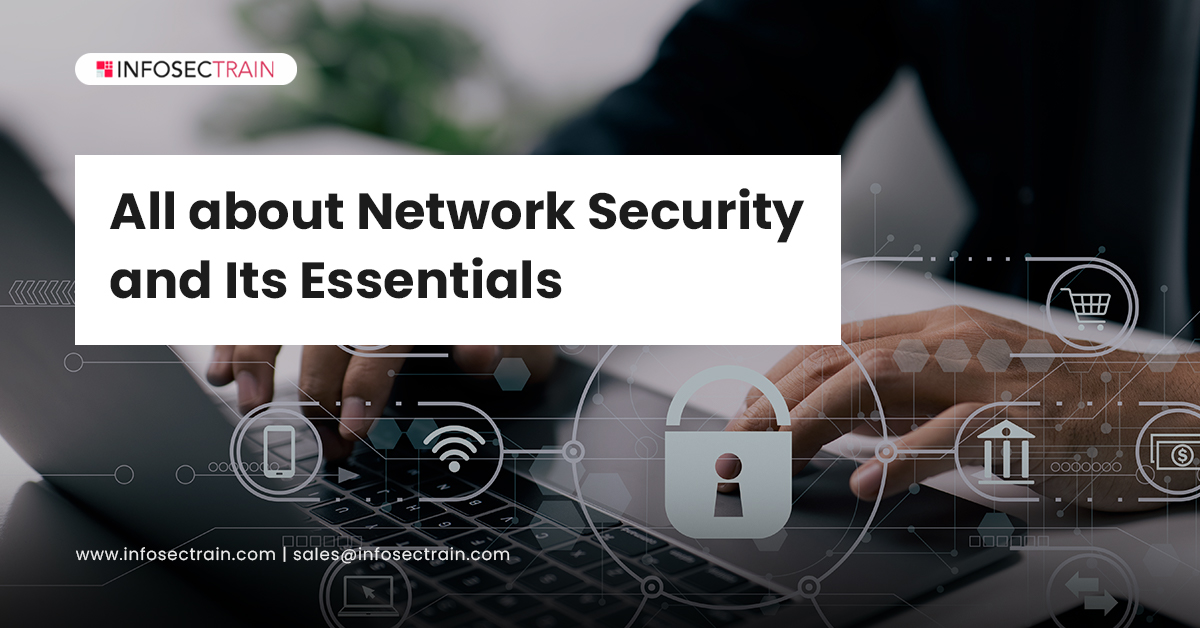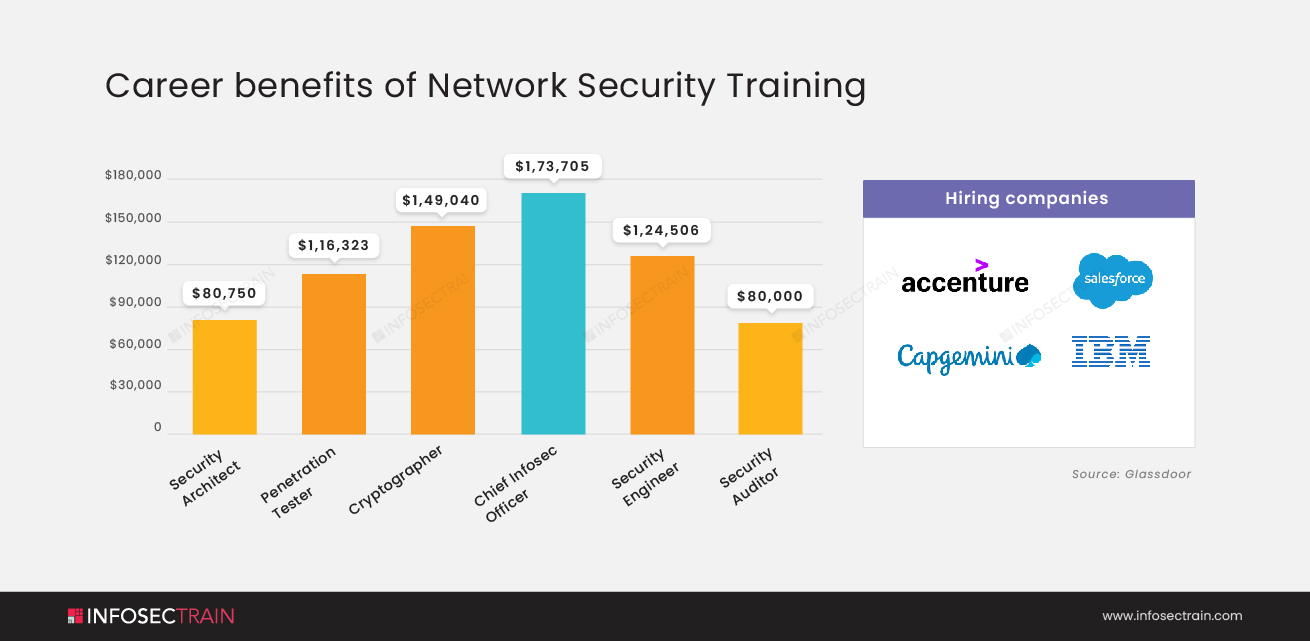All About Network Security & its Essentials

What is Network Security?
Network Security is the first line of defense against hackers and other cyber threats. It’s easy to see why Network Security has become so popular, given that cybercrime is expected to cause $6 trillion in global damage by 2021. Most experts define Network Security as policies and procedures to prevent encroachment, modification, misuse, change, destruction, or unauthorized access and reveal data on information systems. Or we can say that the rules and procedures used to mitigate and regulate unauthorized access, misuse, modification, or exclusion of a computer network and its resources are known as Network Security. The entire process necessitates a combination of hardware devices, security software, and user awareness of security procedures and techniques.
What is the Network Security and Essentials Course with InfosecTrain?
Due to the reliance on various verticals of business and personal communication, enterprises of all sizes and scales should have proper digital security and compliance strategies and mitigation processes in place to secure their networks. Although no network is completely secure from cyber threats, an effective and dependable Network Security system can ensure critical security throughout the business’s network system.
- Our Network Security and Essentials training course is specifically designed to help you build your fundamental understanding of how networks and their various components work.
- The course thoroughly covers a wide range of concepts such as networks and networking fundamentals, IP addressing, routers, firewalls, Security Fundamentals, Malware, cryptography, much more,
This Network Security and Essentials training program will assist you in understanding various Network Security threats and attacks that trouble Network Security systems, such as Sniffing, DoS & DDoS attacks, Fraggle, and Smurf attacks, DNS poisoning, and so on.
As Network Security is a significant part of cybersecurity, this course will help advance your career in cybersecurity profiles such as Cybersecurity Engineer, Application Security Engineer, and many others.
Course Content
Let’s look at what you’ll learn and understand throughout this course:
- This course will teach the fundamentals of Network Security and Network Security threats.
- You will explore in-depth knowledge of cyber control and a basic overview of ISO-27001 and PCI-DSS.
- We also cover the networking and Network Security concepts such as routers, WiFi and WiFi security, network monitoring, and firewalls.
- There are also introductory attack-based practicals on Network Security tools like Nessus, OpenVAS, Nmap, Wireshark, etc.
- We will explore prevention and mitigation processes and concepts to effectively counter potential Network Security threats and identify network vulnerabilities.
- You will explore the introductory part of browser security and its components and concepts of Cryptography and Authentication.
Career Benefits of Pursuing this Course
The rise in cybercrime has coincided with increased demand for Network Security professionals. Not only are there a lot of opportunities, but the job security is good, and the pay is good. The course will assist you in obtaining a lucrative position in one of 100 Multinational companies. Here are the most common security jobs, along with their salaries:

- Security Architect: Within an organization’s IT network, a Security Architect designs, builds, tests, and implements security systems. To anticipate threats, the Security Architect has a thorough understanding of an organization’s IT system’s potential security risks, identifies areas of weakness, and reacts appropriately to cyber threats.
- Penetration Tester: The typical role of a Penetration Tester in the organization are conducting tests on networks and applications, physical security assessment, conducting security audits, and analyzing security policies in IT firms.
- Cryptographer: As we all know, cryptography is an information security tactic that uses codes to protect enterprise information and communication from cyber threats, which is a responsibility of a Cryptographer.
- Chief Infosec Officer: The Chief Infosec Officer or Chief Information Security Officers, also referred to as Vice Presidents of Security, are senior executives in charge of a company’s information and data security. They ensure that privileged company information is not compromised due to internal or external breaches in collaboration with the board of directors.
- Security Engineer: In the IT industry, Security Engineers are the first line of defense against cybercriminals. They examine their organization’s critical IT infrastructure for flaws and devise effective countermeasures to prevent future incidents.
- Security Auditor: A Security Auditor examines the security and effectiveness of computer systems and their components. A Security Auditor is primarily concerned with computer systems that are out of date and potentially vulnerable to a cyberattack.
Why Network Security and Essentials Course?
Many factors in our lives have made the transition to the digital realm. We can find everything from birth dates, social security (or other identification numbers), health history, credit history, bank accounts, utility bills, and other things on the web. We use the internet for money transfer, communication with family, friends, and work colleagues, buying stuff, amusement, and research.
Threat actors have access to all of those activities and transactions. The more time we devote to the internet, the greater the risk of being hacked. In addition, as the Internet of Things (IoT) grows in popularity, reliance on wireless networks only adds to the threat landscape by giving criminals more avenues and opportunities to commit fraud. There is too much on the segment in our personal and professional lives to impact network security.
Therefore the market for Network Security is multiplying, and demand for Network Security professionals is exploding. Let’s take a look at these statistics about Network Security:
- Mobile devices now account for more than 55% of global internet traffic, introducing new trends and new problems for networks to handle and protect mobile traffic.
- Automated sources such as bots, hacking operations, spammers, and impersonators are responsible for 56% of all internet traffic.
- Approximately 4,000 ransomware attacks occur daily.
Network Security professionals not only prevent these threats but also strengthen your company’s operations to avoid data loss, fines, and legal ramifications, as well as disrupted operations.
Why Network Security with InfosecTrain?
If all of this information about Network Security and essentials has piqued your interest in starting a new (or better) career in the field, InfosecTrain can assist you in that. The course includes 32 hours of instructor-led training that covers the fundamentals of various concepts in Network Security.
There are plenty of factors you might consider to enroll in this Network Security and Essential course with InfosecTrain, such as:
- You’ll learn about various technical skills and tools necessary for a career in Network Security.
- You’ll have access to online videos, study materials, as well as practical and live sessions with our knowledgeable instructors.
- You’ll get a course completion certificate after completing your training.
- If you are stuck with any doubt during your training period, the trainer will clear it instantly.
- After completing your training, we also offer post-training support if you need any support regarding your course.
So, visit InfosecTrain now and learn everything there is to know about Network Security. In today’s security-conscious digital world, the skills you learn are becoming increasingly sought-after and beneficial.







 1800-843-7890 (India)
1800-843-7890 (India)